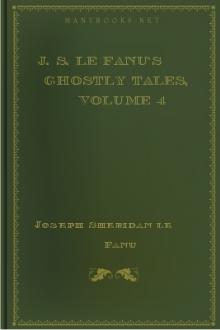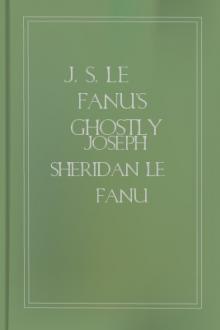J. S. Le Fanu's Ghostly Tales, Volume 4 - Joseph Sheridan Le Fanu (free ebook reader for iphone txt) 📗

- Author: Joseph Sheridan Le Fanu
- Performer: -
Book online «J. S. Le Fanu's Ghostly Tales, Volume 4 - Joseph Sheridan Le Fanu (free ebook reader for iphone txt) 📗». Author Joseph Sheridan Le Fanu
This was no other than a column of foot soldiers, marching with perfect regularity towards the village, and headed by an officer on horseback. They were at the far side of the turnpike, which was closed; but much to his perplexity he perceived that they marched on through it without appearing to sustain the least check from that barrier.
On they came at a slow march; and what was most singular in the matter was, that they were drawing several cannons along with them; some held ropes, others spoked the wheels, and others again marched in front of the guns and behind them, with muskets shouldered, giving a stately character of parade and regularity to this, as it seemed to Peter, most unmilitary procedure.
It was owing either to some temporary defect in Peter's vision, or to some illusion attendant upon mist and moonlight, or perhaps to some other cause, that the whole procession had a certain waving and vapoury character which perplexed and tasked his eyes not a little. It was like the pictured pageant of a phantasmagoria reflected upon smoke. It was as if every breath disturbed it; sometimes it was blurred, sometimes obliterated; now here, now there. Sometimes, while the upper part was quite distinct, the legs of the column would nearly fade away or vanish outright, and then again they would come out into clear relief, marching on with measured tread, while the cocked hats and shoulders grew, as it were, transparent, and all but disappeared.
Notwithstanding these strange optical fluctuations, however, the column continued steadily to advance. Peter crossed the street from the corner near the old bridge, running on tip-toe, and with his body stooped to avoid observation, and took up a position upon the raised footpath in the shadow of the houses, where, as the soldiers kept the middle of the road, he calculated that he might, himself undetected, see them distinctly enough as they passed.
"What the div—, what on airth," he muttered, checking the irreligious ejaculation with which he was about to start, for certain queer misgivings were hovering about his heart, notwithstanding the factitious courage of the whiskey bottle. "What on airth is the manin' of all this? is it the French that's landed at last to give us a hand and help us in airnest to this blessed repale? If it is not them, I simply ask who the div—, I mane who on airth are they, for such sogers as them I never seen before in my born days?"
By this time the foremost of them were quite near, and truth to say they were the queerest soldiers he had ever seen in the course of his life. They wore long gaiters and leather breeches, three-cornered hats, bound with silver lace, long blue coats, with scarlet facings and linings, which latter were shewn by a fastening which held together the two opposite corners of the skirt behind; and in front the breasts were in like manner connected at a single point, where and below which they sloped back, disclosing a long-flapped waistcoat of snowy whiteness; they had very large, long cross-belts, and wore enormous pouches of white leather hung extraordinarily low, and on each of which a little silver star was glittering. But what struck him as most grotesque and outlandish in their costume was their extraordinary display of shirt-frill in front, and of ruffle about their wrists, and the strange manner in which their hair was frizzled out and powdered under their hats, and clubbed up into great rolls behind. But one of the party was mounted. He rode a tall white horse, with high action and arching neck; he had a snow-white feather in his three-cornered hat, and his coat was shimmering all over with a profusion of silver lace. From these circumstances Peter concluded that he must be the commander of the detachment, and examined him as he passed attentively. He was a slight, tall man, whose legs did not half fill his leather breeches, and he appeared to be at the wrong side of sixty. He had a shrunken, weather-beaten, mulberry-coloured face, carried a large black patch over one eye, and turned neither to the right nor to the left, but rode on at the head of his men, with a grim, military inflexibility.
The countenances of these soldiers, officers as well as men, seemed all full of trouble, and, so to speak, scared and wild. He watched in vain for a single contented or comely face. They had, one and all, a melancholy and hang-dog look; and as they passed by, Peter fancied that the air grew cold and thrilling.
He had seated himself upon a stone bench, from which, staring with all his might, he gazed upon the grotesque and noiseless procession as it filed by him. Noiseless it was; he could neither hear the jingle of accoutrements, the tread of feet, nor the rumble of the wheels; and when the old colonel turned his horse a little, and made as though he were giving the word of command, and a trumpeter, with a swollen blue nose and white feather fringe round his hat, who was walking beside him, turned about and put his bugle to his lips, still Peter heard nothing, although it was plain the sound had reached the soldiers, for they instantly changed their front to three abreast.
"Botheration!" muttered Peter, "is it deaf I'm growing?"
But that could not be, for he heard the sighing of the breeze and the rush of the neighbouring Liffey plain enough.
"Well," said he, in the same cautious key, "by the piper, this bangs Banagher fairly! It's either the Frinch army that's in it, come to take the town iv Chapelizod by surprise, an' makin' no noise for feard iv wakenin' the inhabitants; or else it's—it's—what it's—somethin' else. But, tundher-an-ouns, what's gone wid Fitzpatrick's shop across the way?"
The brown, dingy stone building at the opposite side of the street looked newer and cleaner than he had been used to see it; the front door of it stood open, and a sentry, in the same grotesque uniform, with shouldered musket, was pacing noiselessly to and fro before it. At the angle of this building, in like manner, a wide gate (of which Peter had no recollection whatever) stood open, before which, also, a similar sentry was gliding, and into this gateway the whole column gradually passed, and Peter finally lost sight of it.
"I'm not asleep; I'm not dhramin'," said he, rubbing his eyes, and stamping slightly on the pavement, to assure himself that he was wide awake. "It is a quare business, whatever it is; an' it's not alone that, but everything about town looks strange to me. There's Tresham's house new painted, bedad, an' them flowers in the windies! An' Delany's house, too, that had not a whole pane of glass in it this morning, and scarce a slate on the roof of it! It is not possible it's what it's dhrunk I am. Sure there's the big tree, and not a leaf of it changed since I passed, and the stars overhead, all right. I don't think it is in my eyes it is."
And so looking about him, and every moment finding or fancying new food for wonder, he walked along the pavement, intending, without further delay, to make his way home.
But his adventures for the night were not concluded. He had nearly reached the angle of the short land that leads up to the church, when for the first time he perceived that an officer, in the uniform he had just seen, was walking before, only a few yards in advance of him.
The officer was walking along at an easy, swinging gait, and carried his sword under his arm, and was looking down on the pavement with an air of reverie.
In the very fact that he seemed unconscious of Peter's presence, and disposed to keep his reflections to himself, there was something reassuring. Besides, the reader must please to remember that our hero had a quantum sufficit of good punch before his adventure commenced, and was thus fortified against those qualms and terrors under which, in a more reasonable state of mind, he might not impossibly have sunk.
The idea of the French invasion revived in full power in Peter's fuddled imagination, as he pursued the nonchalant swagger of the officer.
"Be the powers iv Moll Kelly, I'll ax him what it is," said Peter, with a sudden accession of rashness. "He may tell me or not, as he plases, but he can't be offinded, anyhow."
With this reflection having inspired himself, Peter cleared his voice and began—
"Captain!" said he, "I ax your pardon, captain, an' maybe you'd be so condescindin' to my ignorance as to tell me, if it's plasin' to yer honour, whether your honour is not a Frinchman, if it's plasin' to you."
This he asked, not thinking that, had it been as he suspected, not one word of his question in all probability would have been intelligible to the person he addressed. He was, however, understood, for the officer answered him in English, at the same time slackening his pace and moving a little to the side of the pathway, as if to invite his interrogator to take his place beside him.
"No; I am an Irishman," he answered.
"I humbly thank your honour," said Peter, drawing nearer—for the affability and the nativity of the officer encouraged him—"but maybe your honour is in the sarvice of the King of France?"
"I serve the same King as you do," he answered, with a sorrowful significance which Peter did not comprehend at the time; and, interrogating in turn, he asked, "But what calls you forth at this hour of the day?"
"The day, your honour!—the night, you mane."
"It was always our way to turn night into day, and we keep to it still," remarked the soldier. "But, no matter, come up here to my house; I have a job for you, if you wish to earn some money easily. I live here."
As he said this, he beckoned authoritatively to Peter, who followed almost mechanically at his heels, and they turned up a little lane near the old Roman Catholic chapel, at the end of which stood, in Peter's time, the ruins of a tall, stone-built house.
Like everything else in the town, it had suffered a metamorphosis. The stained and ragged walls were now erect, perfect, and covered with pebble-dash; window-panes glittered coldly in every window; the green hall-door had a bright brass knocker on it. Peter did not know whether to believe his previous or his present impressions; seeing is believing, and Peter could not dispute the reality of the scene. All the records of his memory seemed but the images of a tipsy dream. In a trance of astonishment and perplexity, therefore, he submitted himself to the chances of his adventure.
The door opened, the officer beckoned with a melancholy air of authority to Peter, and entered. Our hero followed him into a sort of hall, which was very dark, but he was guided by the steps of the soldier, and, in silence, they ascended the stairs. The moonlight, which shone in at the lobbies, showed an old, dark wainscoting, and a heavy, oak banister. They passed by closed doors at different landing-places, but all was dark and silent as, indeed, became that late hour of the night.
Now they ascended to the topmost floor. The captain paused for a minute at the nearest door, and, with a heavy groan, pushing it open, entered the room. Peter remained at the threshold. A slight female form in a sort of loose, white robe, and with a great deal of dark hair hanging loosely about her, was standing in the middle of the floor, with her back towards them.
The soldier stopped short before he reached her, and said, in a voice of great anguish, "Still the same, sweet bird—sweet bird! still the same." Whereupon, she turned suddenly, and threw her arms about the neck of the officer, with a gesture of fondness and despair, and her frame was agitated as if by a burst of sobs. He held her close to his breast in silence; and honest Peter felt a strange terror creep over him, as he witnessed these mysterious sorrows and endearments.
"To-night, to-night—and then ten years more—ten long years—another ten years."
The officer and the lady seemed to speak these words together; her voice mingled with his in a musical and fearful wail, like a distant summer wind, in the dead hour of night, wandering through ruins. Then he heard the officer say, alone, in a voice





Comments (0)